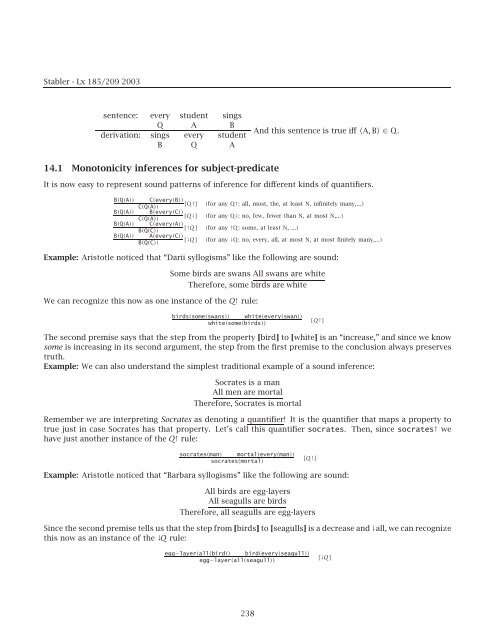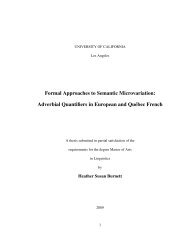Notes on computational linguistics.pdf - UCLA Department of ...
Notes on computational linguistics.pdf - UCLA Department of ...
Notes on computational linguistics.pdf - UCLA Department of ...
Create successful ePaper yourself
Turn your PDF publications into a flip-book with our unique Google optimized e-Paper software.
Stabler - Lx 185/209 2003<br />
sentence: every student sings<br />
Q A B<br />
derivati<strong>on</strong>: sings every student<br />
B Q A<br />
14.1 M<strong>on</strong>ot<strong>on</strong>icity inferences for subject-predicate<br />
And this sentence is true iff 〈A, B〉 ∈Q.<br />
It is now easy to represent sound patterns <strong>of</strong> inference for different kinds <strong>of</strong> quantifiers.<br />
B(Q(A)) C(every(B))<br />
[Q ↑] (for any Q ↑: all, most, the, at least N, infinitely many,...)<br />
C(Q(A))<br />
B(Q(A)) B(every(C))<br />
C(Q(A))<br />
[Q↓] (for any Q ↓: no, few, fewer than N, at most N,...)<br />
B(Q(A)) C(every(A))<br />
B(Q(C))<br />
[↑Q] (for any ↑Q: some, at least N, ...)<br />
B(Q(A)) A(every(C))<br />
[↓Q] (for any ↓Q: no, every, all, at most N, at most finitely many,...)<br />
B(Q(C))<br />
Example: Aristotle noticed that “Darii syllogisms” like the following are sound:<br />
Some birds are swans All swans are white<br />
Therefore, some birds are white<br />
We can recognize this now as <strong>on</strong>e instance <strong>of</strong> the Q↑ rule:<br />
birds(some(swans)) white(every(swan))<br />
white(some(birds))<br />
The sec<strong>on</strong>d premise says that the step from the property [bird] to [white] is an “increase,” and since we know<br />
some is increasing in its sec<strong>on</strong>d argument, the step from the first premise to the c<strong>on</strong>clusi<strong>on</strong> always preserves<br />
truth.<br />
Example: We can also understand the simplest traditi<strong>on</strong>al example <strong>of</strong> a sound inference:<br />
Socrates is a man<br />
All men are mortal<br />
Therefore, Socrates is mortal<br />
Remember we are interpreting Socrates as denoting a quantifier! It is the quantifier that maps a property to<br />
true just in case Socrates has that property. Let’s call this quantifier socrates. Then, since socrates↑ we<br />
have just another instance <strong>of</strong> the Q↑ rule:<br />
socrates(man) mortal(every(man))<br />
socrates(mortal)<br />
Example: Aristotle noticed that “Barbara syllogisms” like the following are sound:<br />
[Q↑]<br />
All birds are egg-layers<br />
All seagulls are birds<br />
Therefore, all seagulls are egg-layers<br />
Since the sec<strong>on</strong>d premise tells us that the step from [birds] to [seagulls] is a decrease and ↓all, we can recognize<br />
this now as an instance <strong>of</strong> the ↓Q rule:<br />
egg−layer(all(bird)) bird(every(seagull))<br />
egg−layer(all(seagull))<br />
238<br />
[Q↑]<br />
[↓Q]
















